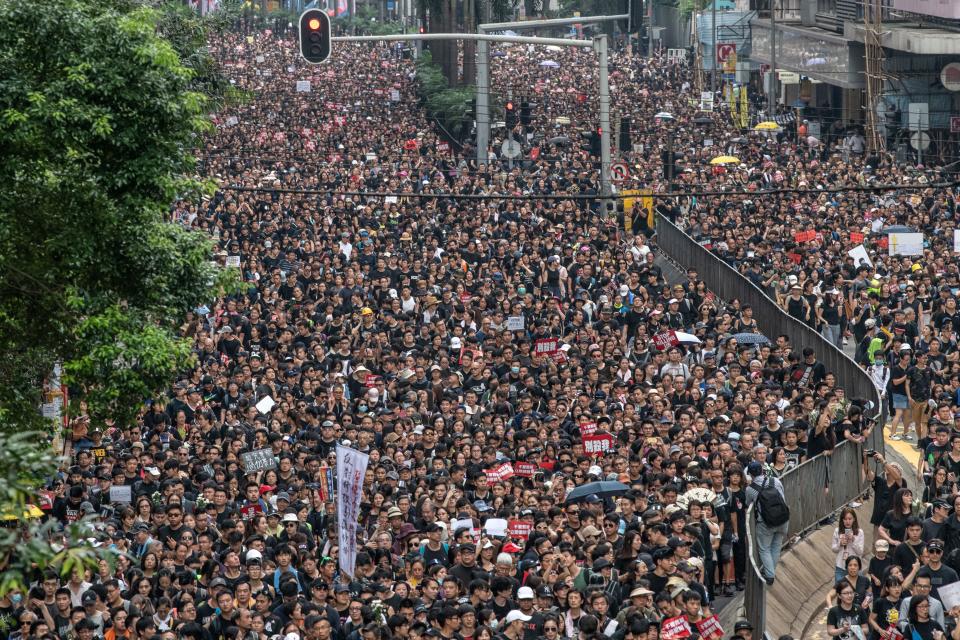Hong Kong activists: We're protesting for our freedom from brutal Chinese authoritarianism

The winds of freedom are howling in Hong Kong, most obviously in the recent protests against the proposed extradition bill.
One of the co-authors of this column, democracy activist Joshua Wong, felt it when he was released from prison Monday and joined his fellow citizens in protest.
In face of the direct threat of the extradition bill proposed by Hong Kong's chief executive, as many as 1 million people joined in a demonstration June 9 to show our discontent with the amendment, which would send local and foreign residents of Hong Kong to the justice system of China.
Instead of demanding larger constitutional reform, demonstrators urged the government to withdraw the extradition bill in order to maintain the value of "one country, two systems." However, the government of Hong Kong insisted on moving forward with it.
Hong Kong citizens know the stakes
On June 12, citizens assembled outside the Hong Kong legislature to stop or delay the debate of this dangerous bill. There were clashes, but for many Hong Kongers, the mass demonstration was regarded as a revival of the occupy movement that lasted 79 days in 2014. This month, police were brutal, using rubber bullets and tear gas against and to disperse the assembly.
Carrie Lam, the chief executive of Hong Kong, labeled the assembly as “riot” and still refused to withdraw the bill. Last week, a man wearing a yellow raincoat and who unfurled a banner that said “No extradition to China” died by suicide. Now, Hong Kongers are even more determined to defend our freedom from China’s authoritarian legal system and the rule of law in Hong Kong.
It's not just in Hong Kong: I've fought China's slow-motion genocide of Uighur Muslims. Now, my family are victims.
Lam continues to refuse to withdraw the bill, although she attempted to offer a concession by suspending it, and she issued an apology Tuesday for her inadequate work in the legislative process.
In contrast, when half a million Hong Kongers demonstrated against the legislation of national security law in 2003, the government officially withdrew the bill and a high ranking official resigned.
Worse still, Lam had not responded to mainstream demands of setting an independent panel to investigate police brutality on the June 12 assembly, nor has she retracted her characterization of the assembly as “riot.” In reality, she has not compromised at all.
But Hong Kongers are less concerned with Lam than we are with sustaining the winds of freedom. An obvious threat to Hong Kong’s freedom lies in the violence of law enforcement against the June 12 protesters. Videos show police beating a protester trying to recover a bottled water. The Hong Kong police used to have a reputation for political neutrality. Their inappropriate actions have shattered that.

Using rubber bullets, beanbag rounds and tear gas against the largely peaceful assembly revealed the disproportionate use of force against civilians. Injured protesters were arrested even at the hospital, despite needing time to recover from their injuries. Many Hong Kongers associate this police brutality with the Tiananmen Square crackdown in Beijing in 1989. When law enforcement in Hong Kong begins to mirror the violence of the People’s Liberation Army in 1989, fear will discourage citizens from publicly expressing their opinions and exercising their rights of assembly and protest. A new era of terror will come to Hong Kong if there is no check to the police and government.
Freedom in Hong Kong counters China
In prison, Joshua Wong's brown uniform was changed once every four days. In these rainy summer days, the extreme heat was so unbearable that turning on the fan only made things worse. There's no privacy in the shared cell. This is the future we must prevent for Hong Kong's democracy activists and citizens.
While the citizens of Hong Kong continue to resist, the international community should make efforts to safeguard Hong Kong’s freedom. We don't ask for foreign interference but rather global action to hold the Hong Kong government accountable to international human rights regime.
Western democracies should keep in mind that commercial trade with Hong Kong and China is worth less than the defense of human rights. After the million-strong protest on June 9, a bipartisan group of American senators reintroduced the Hong Kong Human Rights and Democracy Act to “reaffirm U.S. commitment to democracy, human rights, and the rule of law at a time when Hong Kong’s autonomy is under assault by interference from the Chinese government and Communist Party.”
On the American front: Schumer & Cotton: Our bipartisan 'Fentanyl Sanctions Act' targets traffickers like China
In particular, the bill would require an annual assessment of Hong Kong’s autonomy to justify special treatment afforded to Hong Kong by the U.S.-Hong Kong Policy Act of 1992. This bill would guarantee that our government's trading opportunities do not compromise the values and commitment to human rights and the rule of law in Hong Kong.
Western democracies, especially the United States, have an interest in countering autocratic China. The anti-extradition protests in Hong Kong are on the frontier of resisting China’s authoritarianism and of defending human rights and civil liberties for all of us globally.
Although democracy in Hong Kong is at a stalemate, its winds of freedom are still worthy of protection by the international community.
Joshua Wong is the secretary of Demosisto, an organization working for self-determination in Hong Kong. Follow him on Twitter @joshuawongcf. Eric Lai is a doctoral candidate at the School of Oriental and African Studies, University of London.
You can read diverse opinions from our Board of Contributors and other writers on the Opinion front page, on Twitter @usatodayopinion and in our daily Opinion newsletter. To respond to a column, submit a comment to letters@usatoday.com.
This article originally appeared on USA TODAY: Hong Kong activists: We're protesting for our freedom from brutal Chinese authoritarianism

